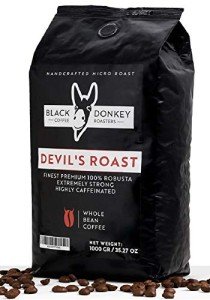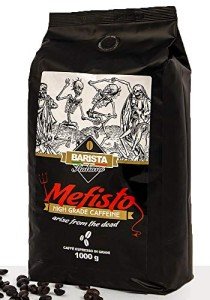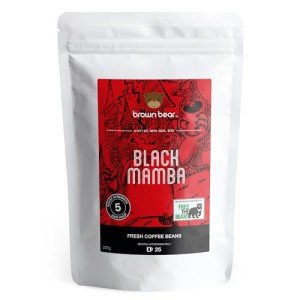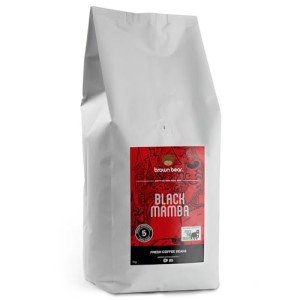In the world of coffee, the choice of beans can dramatically influence the experience that follows every brew. Among the myriad varieties available, Robusta coffee has carved a niche for itself, primarily due to its bold flavor and robust characteristics. Strong 100 Robusta coffee, specifically offered in 250g ground bean packages, is garnering attention for its unique profile that appeals to coffee aficionados and casual drinkers alike. In this article, we will explore the distinct features of Robusta coffee, its benefits, how it compares to other coffee types, and common questions surrounding its use.
Understanding 100% Robusta Coffee
Robusta coffee comes from the Coffea canephora plant and is known for its higher caffeine content and bolder flavor compared to its counterpart, Arabica. Here are some defining characteristics of strong 100 Robusta coffee:
- Flavor Profile: Robusta coffee tends to have a stronger, more bitter flavor. It generally exhibits earthy and nutty notes, with a hint of chocolate.
- Caffeine Content: Robusta beans are known for containing about 30-50% more caffeine than Arabica beans. This makes Robusta an attractive choice for those seeking a strong morning kick.
- Lower Acidity: The lower acidity level of Robusta coffee lends to a smoother drink, which may be easier on the stomach for some consumers.
- Cost-Effectiveness: Robusta plants are easier to cultivate and yield more beans than Arabica, often translating to lower prices in the market.
The Processing of Strong 100 Robusta Coffee
Strong 100 Robusta coffee is typically subjected to careful processing methods. The beans undergo two primary stages:
-
Harvesting: The coffee cherries are harvested when they reach peak ripeness. Given the hardiness of the Robusta plant, harvesting can often be conducted year-round.
-
Processing Methods: The beans can be processed through various methods, including:
- Washed Processing: This method removes the outer fruit before fermentation, often leading to a cleaner cup.
- Natural Processing: Here, the cherries are dried in the sun, allowing for greater fruitiness in the final brew.
Both methods enhance the flavor dynamics and ensure that the strong profile of the Robusta bean shines through.
The Brewing Experience
When it comes to brewing strong 100 Robusta coffee, several techniques can be employed to bring out its robust character. Here are popular brewing methods for this coffee type:
- Espresso Machine: The intense pressure extracts a concentrated flavor, making it a favorite for espresso lovers.
- French Press: This method allows the oils and fine particles to remain in the brew, leading to a fuller body.
- Pour-Over: A slow pour method can help balance the flavors, highlighting the bean’s earthiness.
Whichever method is chosen, the result is often a strong and satisfying cup of coffee that invigorates the senses.
Benefits of Drinking Strong 100 Robusta Coffee
Besides a rich and bold taste, there are numerous benefits associated with strong 100 Robusta coffee. Some noteworthy points include:
-
Energy Boost: The high caffeine content can enhance alertness and combat fatigue, making it an ideal choice for early mornings or long workdays.
-
Rich in Antioxidants: Robusta beans contain a range of antioxidants, which have been shown to help reduce inflammation and combat oxidative stress.
-
Potential Weight Loss Aid: Some studies suggest that caffeine can boost metabolic rates, potentially aiding in weight management.
-
Affordable Option: For coffee lovers on a budget, strong 100 Robusta provides a more economical choice compared to many single-origin Arabica coffees.
Comparison with Other Coffee Beans
To better understand the unique attributes of strong 100 Robusta coffee, a comparison between it and Arabica coffee can provide clarity:
| Feature | Robusta | Arabica |
|---|---|---|
| Caffeine Content | Higher (2.2-2.7%) | Lower (1.2-1.5%) |
| Flavor Profile | Strong, bitter, earthy | Mild, sweet, fruity |
| Shape and Size | Circular and smaller | Oval and larger |
| Cultivation Conditions | Hardy, adaptable | More sensitive |
| Cost | Generally cheaper | Typically pricier |
This comparative analysis shows how strong 100 Robusta stands out distinctly in both flavor and characteristics.
FAQs about Strong 100 Robusta Coffee
1. What makes Robusta coffee stronger than Arabica?
Robusta coffee has a higher caffeine content, which contributes to its strong flavor and intense profile. The beans' lower acidity also plays a role in the perception of strength.
2. Can I mix Robusta with Arabica beans?
Yes, many coffee enthusiasts blend Robusta with Arabica to achieve a balance of flavors and acidity. This is common in espresso blends to enhance crema and body.
3. How should I store my ground Robusta coffee?
To keep your ground Robusta coffee fresh, store it in an airtight container in a cool, dark place, away from moisture and direct sunlight.
4. Is Robusta coffee suitable for every brewing method?
Yes, while Robusta coffee can be enjoyed in various brewing methods, it is particularly favored in espresso preparation due to its rich crema and robust flavor.
5. Does strong 100 Robusta coffee cause heartburn?
Some individuals may find Robusta coffee to be less acidic compared to Arabica, which can be easier on the stomach. However, sensitivity varies from person to person.
Strong 100 Robusta coffee offers a robust and dynamic flavor profile that appeals to a diverse range of coffee lovers. From its higher caffeine content to its unique taste, it stands distinct in the coffee market. Packaging this bold experience in a convenient 250g ground bean bag ensures that coffee enthusiasts can easily incorporate the invigorating flavors of strong 100 Robusta coffee into their daily routines. As more coffee drinkers discover its intense strength and diverse brewing capabilities, Robusta may continue to gain prominence alongside its more traditional Arabica counterpart.






